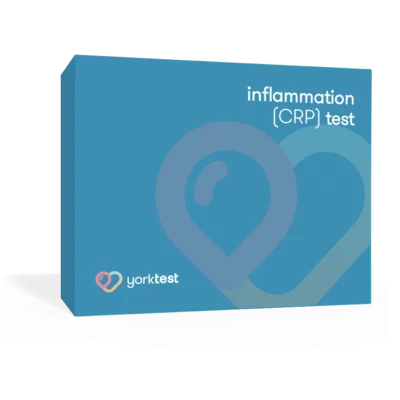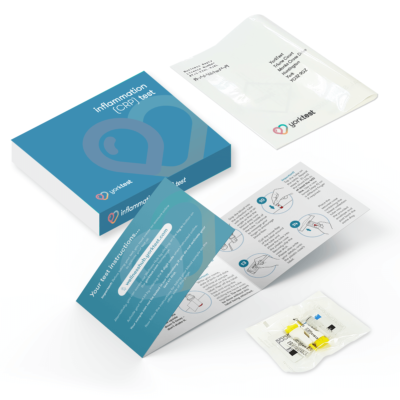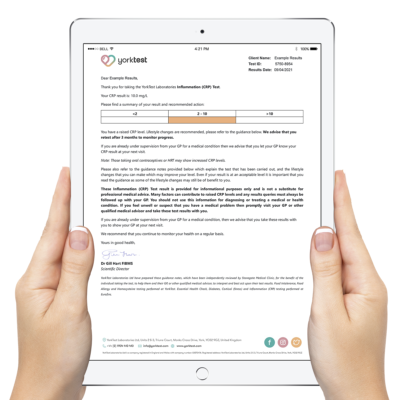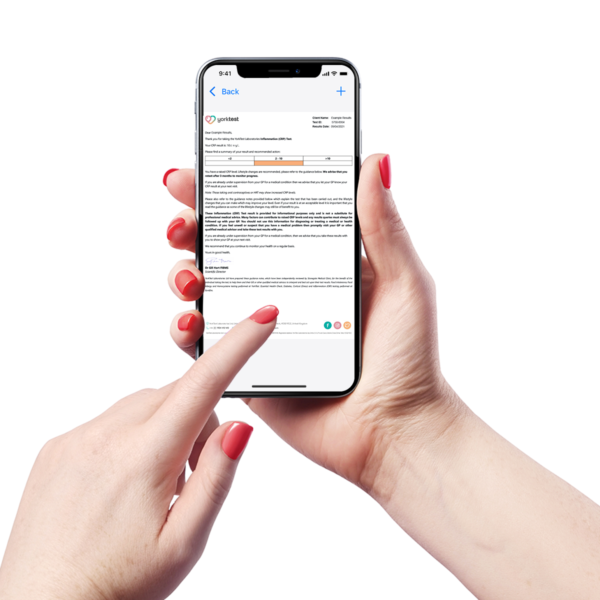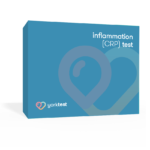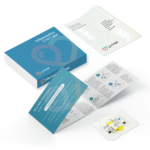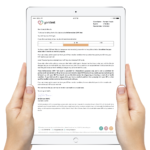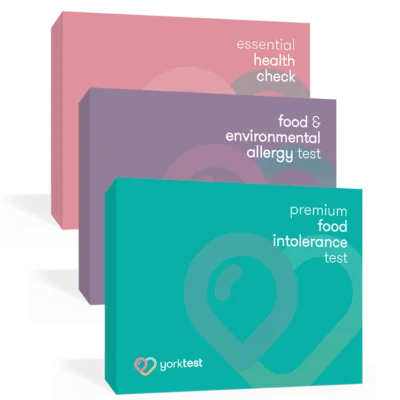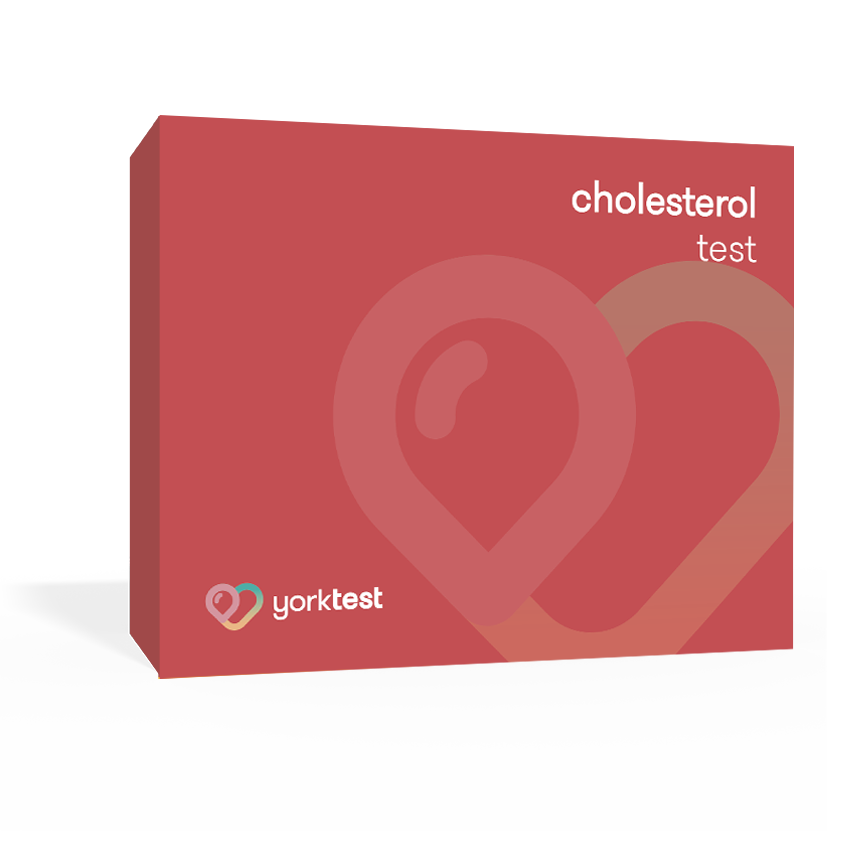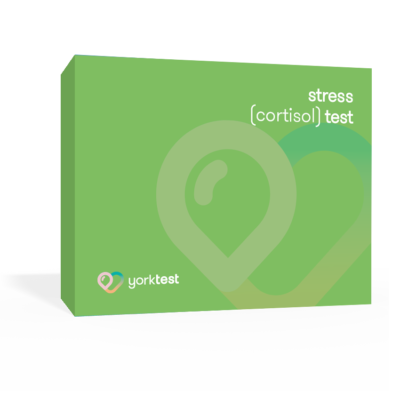Inflammation (CRP) Test
£41
PayPal Credit is like a credit card, without the plastic. It's a credit limit that's attached to your PayPal account which you can use for your online purchases. 0% interest for 4 months is available on single transactions of £99 or more. Find out more
- Add items to your Basket
- Select PayPal as your payment method at checkout
- Log into your PayPal account and chose PayPal Credit as your payment method or apply for PayPal Credit
Representive Example
Representive 23.9% APR (variable); Purchase rate 23.9% p.a (variable); Assumed credit limit £1200.
Credit subject to status. Terms and conditions apply. YorkTest acts as a broker and offers finance from a restricted range of finance providers.
PayPal Credit is a trading name of PayPal (Europe) S.á.r.l et Cie, S.C.A, 22-24 Boulevard Royal L-2449, Luxembourg.
SALE 30% OFF ENDS MONDAY
+ FREE Delivery on all orders
Check levels of inflammation in your body with this simple test
Identify risk of damage or deterioration in your body that you may not be aware of
Risk marker for heart disease, stroke, chronic conditions and infections
- Test for high sensitivity CRP, the most important marker for inflammation
- Simple at-home finger-prick blood test. No social interaction required
- Provides hospital standard, easy-to-read traffic light results
- Supporting guidance provided to help you make effective lifestyle changes
- Receive advice to better support your overall health
- Customers must be aged 18 years or over to take this test. This test is not available to customers who are pregnant or breastfeeding
- Only available in the UK
Optimise your health at home with our Inflammation (CRP) Test
Understand whether inflammation may be impacting your health and what simple steps you can take to reduce it
When you think of inflammation you often think of something you can see like an insect bite, cut or allergic reaction. There might be pain, redness, swelling or itching and you may feel unwell. There is also inflammation that you can’t see which may have been going on for a while. This sort of longer term or chronic inflammation is often “silent” and can cause damage and deterioration that you may not be aware of.
This type of inflammation can impact the whole body and could indicate an underlying health condition or an infection. It also has the potential to damage the heart arteries and blood vessels even if your cholesterol and triglycerides levels are normal.

4 Simple Steps to a Healthier You
What's in the test?

Your kit includes a free return envelope included, making it easy for you to post your sample back to us securely. You can leave the rest to us, while our team of diagnostic experts analyse your sample at our partner laboratory
- Inflammation (CRP) Test
- A prepaid return envelope (UK only)
- Two single-use lancets
- One blood collection tube
- One blood collection tube label
- One plastic blood collection tube case
- Two adhesive plasters
- A cleansing wipe
How the inflammation test can help
The good news is that this type of inflammation can be detected and monitored using the Inflammation (CRP) Test. Raised levels of CRP are not specific to any disease but can tell you if you have inflammation and whether you need to make lifestyle changes or visit your GP.
By using our quick and easy home-to-laboratory finger-prick blood test, you will get your results within 5 days, and you will receive advice on whether your results are acceptable, if lifestyle changes are required, or if a visit to your GP is recommended. Lifestyle guidance is also provided.
Being aware of your CRP level is the first step to making positive changes. It is also easy to track your levels of inflammation over time.
Take steps to change your life for the better

What We Test For
C-reactive protein (CRP)
C-reactive protein (CRP) is primarily produced by your liver, and levels increase when there’s inflammation in the body. Your liver will release CRP into your bloodstream shortly after inflammation – such as the onset of an infection or injury to tissue. You may also produce CRP in the long term if you are at risk of heart disease or certain other chronic conditions. This is why it can be difficult know about these risks without doing a test.
A raised or high CRP level is often the first sign of infection or inflammation – elevated C-reactive protein levels can even precede other symptoms like pain or fever. So, taking a CRP blood test means you may be able to check for markers of a range of infections and other conditions.
Inflammation (CRP) Test FAQs
What is a CRP blood test?
C-reactive protein (CRP) is primarily produced by your liver, and levels increase when there’s inflammation in the body. Your liver will release CRP into your bloodstream shortly after inflammation – such as the onset of an infection or injury to tissue. You may also produce CRP in the long term if you are at risk of heart disease, stroke or certain other chronic conditions. It is important to remember that CRP is not a diagnostic test.
A raised or high CRP level is often the first sign of infection or inflammation – elevated C-reactive protein levels can even precede other symptoms like pain or fever. Inflammation is often caused by your body detecting a foreign ‘attacker’ – such as an infection or irritant. Once it’s identified, your immune system releases chemicals to try and dispel the attacker and keep your body safe.
How much CRP is dangerous?
If your blood sample indicates an elevated C-reactive protein level, it may point to an increased risk of inflammatory conditions. CRP tests use milligrams per litre (mg/L) as a measure. What is considered ‘high’ varies from person to person and also depends on the exact laboratory test used. Optimal levels are usually anything less than 2 mg/L.
If your blood test returns a high C-reactive protein level, we will recommend visiting your GP for further testing. Your doctor may be able to help diagnose the direct cause of your inflammation and prescribe treatments to help or carry out further testing.
What causes high CRP levels?
High CRP levels tend to occur with severe infections, such as sepsis, pneumonia, urinary tract infection, or endocarditis. Other risk factors that can cause mild or moderately raised CRP levels, include:
- Viral illness (like COVID-19)
- Pregnancy
- Depression
- Heart attack (myocardial infarction)
- Cancer
- Bronchitis
- Inflammatory conditions or autoimmune diseases like inflammatory bowel disease, lupus, or rheumatoid arthritis
- Diabetes
- Sedentary lifestyle
- Obesity
- Smoking
How do you reduce CRP level? And how long does it take?
A healthcare provider may prescribe medication but there are dietary and lifestyle changes that can help lower CRP levels:
- Treat the underlying condition
- Weight loss
- Exercise
- Mental outlook and mindfulness
- Diet
- Try and stop smoking
- Certain supplements
What does it mean if your blood test shows inflammation?
If your blood test shows inflammation, this means that you are experiencing either acute or chronic inflammation somewhere in your body.
What’s the difference between acute and chronic inflammation?
There are two types of inflammation:
Acute inflammation – your body responds to sudden damage like a cut, an infection, or muscle injury, and sends inflammatory cells to begin the healing process.
Chronic inflammation – your body sends inflammatory cells when there is no trigger (bacteria or injury). This is the case for autoimmune diseases such as rheumatoid arthritis where inflammatory cells can attack joint tissue and cause damage and pain.
Why is high CRP a risk factor for heart disease and stroke?
In addition to high blood pressure and high total cholesterol – individuals who have high CRP levels are suggested to be at high risk of stroke/heart disease. This is because inflammation can swell cholesterol-crammed artery walls, weakening the lining of those arteries, which may then break down or burst. If you are concerned about your cholesterol levels, you can also try our at-home Cholesterol Test.
Case Studies

Charlotte Rollings
“I am incredibly grateful. I wish I’d known about YorkTest Laboratories much sooner.”
- Brain Fog/Inability to Concentrate
- IBS / Digestive Problems
- Tiredness / Fatigue

David Brown
“I am a different person and the brain fog, anxiety and depression have now disappeared. I feel reborn and finally have my life back”
- Mental Health
- Tiredness / Fatigue

Christopher Parrish
“Extremely helpful. I feel much happier and healthier.”
- IBS / Digestive Problems
- Stomach Issues
- Weight Management

Julie Castledon
- IBS / Digestive Problems
- Nausea
- Tiredness / Fatigue

Alison Dunn
“The entire engagement with YorkTest from end to end was very easy, professional and fast”
- IBS / Digestive Problems


